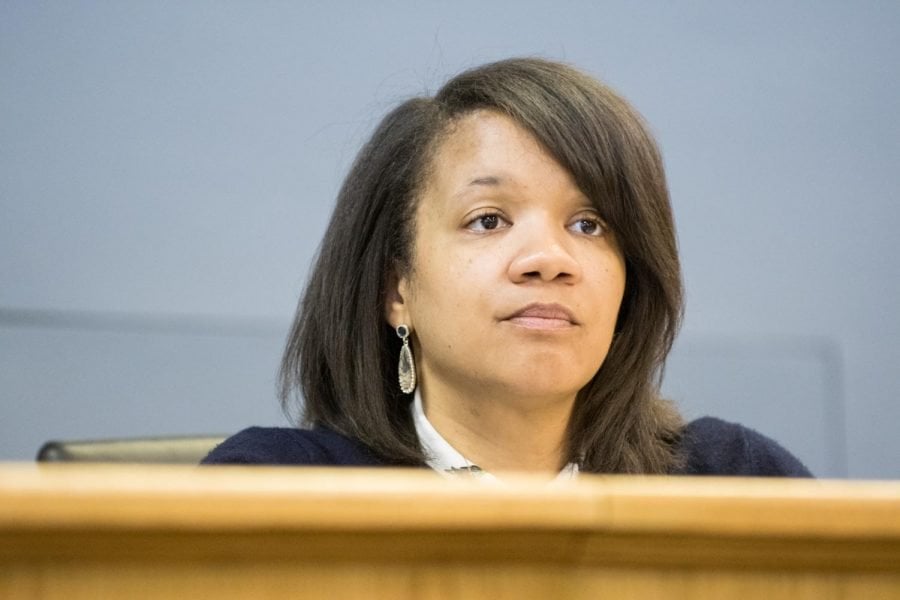Homeownership assistance reparations program continues to take shape
Daily file photo by Colin Boyle
Ald. Robin Rue Simmons (5th). Simmons participated in a conversation surrounding racial healing and reparations on Tuesday.
December 23, 2020
Reparations subcommittee members met virtually Friday to continue developing a Restorative Housing Reparations program, the first facet of the city’s reparations initiative.
As part of the city’s $10 million reparations fund, which includes revenue from a recreational cannabis retailers tax and resident donations, city officials have budgeted $400,000 for the homeownership assistance program. Recipients, who must be directly descended from Black residents living in Evanston between 1919 and 1969, will be able to use the money toward purchasing, renovating or paying a mortgage on a home.
Ald. Ann Rainey (8th) said the city is currently receiving between $35,000 and $40,000 each month in tax revenue from cannabis sold at MedMen, the city’s only dispensary. Ald. Peter Braithwaite (2nd) said that number could increase as MedMen undertakes a renovation to receive more business.
Ald. Robin Rue Simmons (5th) said the city has yet to determine the documentation residents need to prove eligibility for the reparations. These materials could include records of residency and census data.
Rue Simmons said after the city certifies a resident’s eligibility for reparations, they will be able to qualify for other program benefits, as well as for opportunities offered by other institutions like the Evanston Community Foundation.
“That’ll take a lot of the redundancy of due diligence off of accessing these benefits in other places that are partnering with this reparations effort,” she said.
Braithwaite said some local groups are establishing independent funds, taking an approach to repair that differs from the city’s strategy.
He said the city is working to brand its reparations work with a logo so residents can more easily distinguish between the subcommittee’s programs and reparations work that is not connected with the city.
“Please be mindful of where you’re directing your funds,” Braithwaite said. “Always be skeptical of anyone who’s asking for those funds if it is not connected with the work that we’re doing.”
Funds for the housing program will be sent directly to financial institutions for residents to use. Recipients will also need to qualify for a mortgage and meet the bank’s Community Reinvestment Act requirements to receive the up-to-$25,000 on offer. Rue Simmons told The Daily the staff involved at the subcommittee’s currently designated financial institution are Black.
In an open letter from Our Village: The Black Evanstonian read during public comment, the group’s founder, Ndona Nyomo, called for the city to pursue reparations in the form of cash payments rather than through social programs.
The letter also said many legacy Black Evanstonian residents, whose families have lived in the city for at least three generations, feel they have not been directly consulted about the reparations process and take issue with the formation of a group to filter proposals for the fund’s use.
“We do not agree with the proposal for a council to be created to act as an overseer and a gatekeeper,” Nyomo read. “Accepting said proposal will create further barriers for the segment of our community that has been excluded for far too long.”
Interim assistant city manager Kimberly Richardson read a comment expressing concern that residents with poor credit could be prevented from receiving reparations.
“Will there be a lower credit requirement to qualify?” the comment said. “Because of the history of socioeconomic inequality, it has been difficult for many to maintain good credit.”
A Black resident stakeholder meeting will convene Jan. 14. At the meeting, Rue Simmons said participants will prepare a list of priorities to direct other entities and organizations that are in the process of developing additional reparations initiatives.
She said it is crucial Black residents remain central to the planning process as new funds take shape.
“If we continue to do what we’ve done to date without the Black voice being the lead, and without considering our data, considering our history, and looking at opportunities, we’ll only continue to sustain the oppression and the disparity that we have here in Evanston,” she later told The Daily in an interview.
Rue Simmons also told The Daily she is hopeful the homeownership assistance program will begin implementation by spring 2021.
Email: [email protected]
Twitter: @maia_spoto
Related Stories:
— City: Black residents may be eligible for up to $25,000 in housing assistance as part of reparations fund
— Reparations Subcommittee discusses plans for moving forward with their goals, including a new commission
— Reparations subcommittee backs national reparations bills, talks progress updates during town hall


